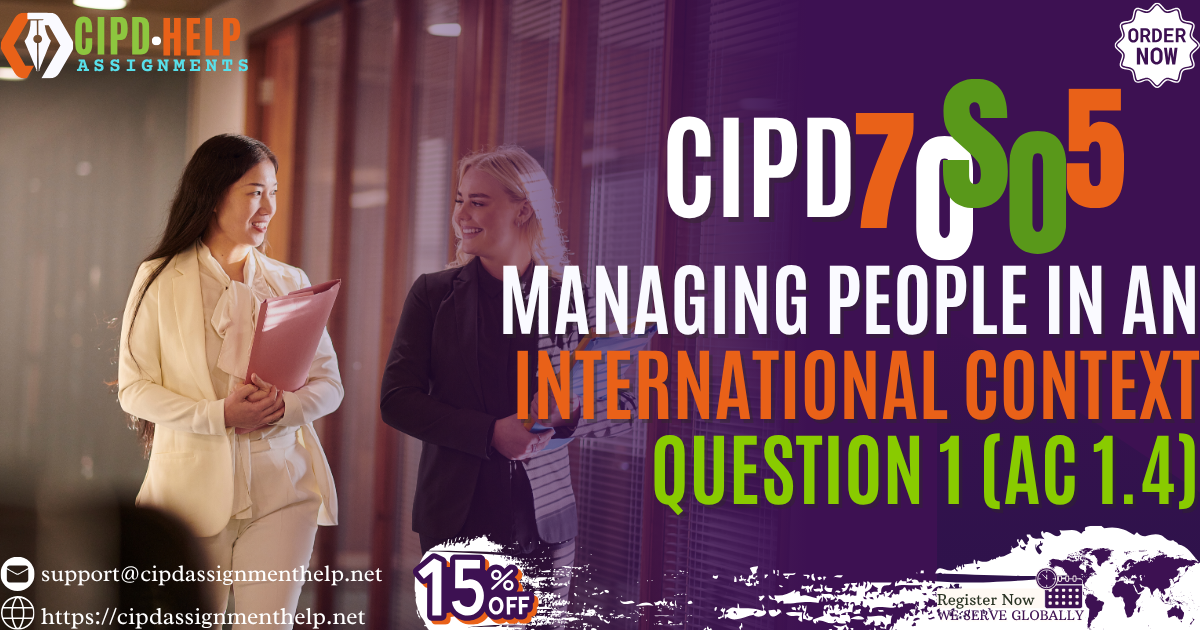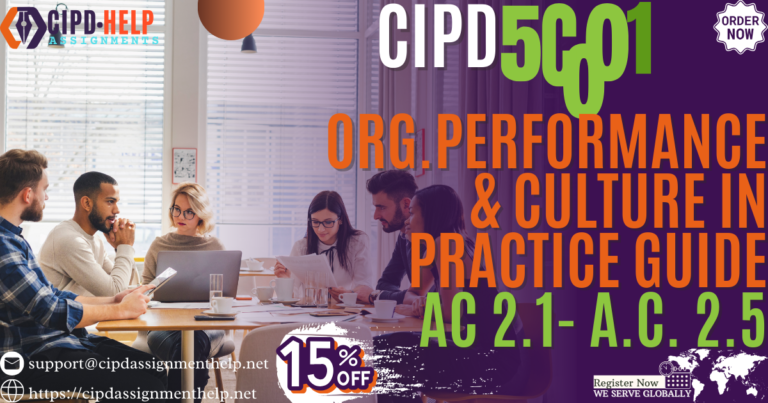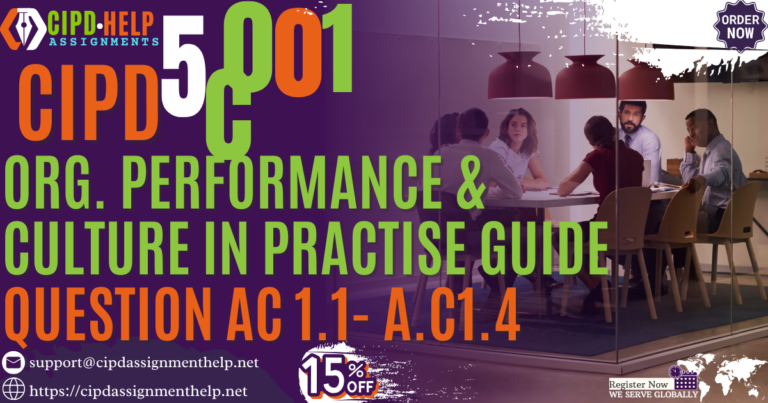7OS05 Managing people in An International Context Question 1 (AC 1.4)
7OS05 Managing People in an International Context Question 1 (AC 1.4), is one of those modules that sounds broader than it feels once you’re in it. It touches on international HR, yes, but also asks you to think about people, real people, working across cultures, systems, and expectations that don’t always fit together neatly. There’s a bit of discomfort in that, and maybe that’s the point.
Sometimes, as we’ve seen from students we’ve worked with, it’s not the theory that trips you up. It’s trying to reconcile local practice with international pressures. Or figuring out how something like performance management plays out in a context where ‘performance’ isn’t defined the same way everywhere.
We think the value of this unit is in the questions it asks more than the answers it gives. You’re invited, or perhaps pushed, to reconsider what you thought was standard HR practice. That’s not always easy. It can feel a bit disorienting, but also, strangely familiar. Everyone’s had that moment where you think, this might work in the UK. but would it land the same way in Mumbai or Nairobi? That’s where the learning really starts.
Case study
You work in a senior people management role in a UK-based clothing retail and distribution company that specialises in sportswear. It is called Fitter Threads Ltd and has grown considerably in recent years with the successful development of a big online store. The business model involves commissioning, sourcing and shipping products from factories based in developing countries for distribution, in the main, to customers in Europe and North America. Profit margins are excellent, but in recent years, as the company has expanded rapidly and new suppliers have been engaged, managers have been concerned about reliability of supply. Orders are not always delivered to the warehouse on time, and there have been justified complaints made by customers about a decline in product quality.
Senior managers have thus made the decision to acquire some garment factories in Asia and to start managing them directly. It is a risky decision, as the company has no experience at all of managing operations overseas, but it is considered strategically necessary in order to permit further expansion of the core business. Three manufacturing sites have been identified, all of which have established factories which already supply Fitter Threads Ltd, based in different countries.
Deals have been done and in the next few weeks all three will become wholly-owned subsidiaries of the UK-based company. A long-term approach is being taken as far as people management strategy is concerned. Change will be introduced steadily over the next two years as investments are made in the new manufacturing operations with a view both to expanding them and upgrading plant and equipment. Meanwhile a two-pronged approach will be taken to the development of international managers:
i) Three experienced Fitter Threads Ltd personnel will be appointed to join the established management teams in each of the sites. This means that a total of nine UK nationals will be expatriated (potentially with their families) to work at senior levels in the newly acquired operations for a period of three to five years.
ii) Three experienced managers from each of the Asian factories will be invited to work in Fitter Threads Ltd’s UK operations over the coming year with a view to learning about the company’s systems, its culture and, particularly, its expectations in respect of people management. This means that nine people (again potentially with their families) will temporarily be ‘inpatriated’ from Asia to the UK.
Senior managers are particularly concerned to ensure that their new operations observe corporate norms in areas such as business ethics, environmental protection, health and safety, employee voice and fair recruitment practices. These all currently accord with ‘best practice’ principles as this term is generally understood in the UK. Managers are aware that such norms are presently very often not observed in their newly acquired operations as this is not common practice in the garment industry in the countries they are investing in. They understand that this will be challenging, but are very concerned not least for public relations reasons, to ensure that basic standards are maintained globally across all their sites in the future.
You are asked to provide advice to Fitter Threads Ltd’s senior management team. For the purposes of this assessment, you are free to choose which three locations in Asia you wish to research and write about. You must, however, choose three different countries.
Your final report should be 4000 words (+/- 10%) in length and should address each of the following questions fully and directly:
Question 1 (AC 1.4): Discuss what you consider to be the most important people-related ethical issues that Fitter Threads Ltd may have to grapple with in its newly acquired Asian operations. Which of these will potentially carry the biggest reputational risks? Justify your answer with reference to examples.
Step-by-Step Breakdown
If you try to answer it too quickly, you risk being vague. This is where most students go off track, they try to sound right instead of being precise.
1️⃣ “Discuss what you consider to be…”
This is not a listing exercise. It’s a discussion. That means you need to:
- Pick out what you think are the most relevant ethical issues.
- Explain why those ones matter more than others in this context.
- Bring in some interpretation, not just facts, but what you make of those facts in this case.
So, this is about making a judgement, not giving a generic overview of all possible ethical issues in the world.
2️⃣ “People-related ethical issues”
You’re not being asked to talk about finance or technology or even production standards here, just the human side of the ethics.
Think of things like:
- Working conditions
- Health and safety
- Discrimination
- Exploitation (e.g., forced overtime, wage suppression)
- Lack of voice or representation
- Misuse of local hiring practices
- Child labour or underage workers
- Cultural insensitivity or disregard for local labour customs
So, anything that involves how people are treated at work, particularly in relation to fairness, dignity, and respect.
3️⃣ “In its newly acquired Asian operations”
This keeps your answer focused. These are factories Fitter Threads has just bought in three different countries in Asia. It’s not about your UK HQ.
You’re dealing with:
- Factories in developing nations
- Possibly very different legal standards or weak enforcement
- Cultural norms that might not reflect UK expectations
- A shift from outsourced supplier relationships to direct ownership, this matters because now Fitter Threads is responsible, not just a client.
We’ll choose Bangladesh, Vietnam, and India, three real-world examples with active garment sectors, all supplying Western retailers, and each with their own people-related challenges.
4️⃣ “Which of these will carry the biggest reputational risks?”
This is the heart of the second half. Not all ethical issues will damage your reputation equally.
Ask:
- What would cause public backlash if it came out?
- What would your UK customers, or UK-based media, or investors react most strongly to?
- What kinds of issues tend to blow up into scandals?
You’re not just saying “this is wrong” you’re saying “this could really hurt us if we don’t get it right.”
5️⃣ “Justify your answer with examples”
This means you must explain your reasoning and give practical examples, either from:
- The case study
- Real events from the countries you’ve chosen
- Reasonable assumptions based on the garment industry
No theory-only answers. Bring it to life. Be grounded. Be realistic. Be human.
Answer Strategy
We’ll structure the answer like this (you’ll do this in your final submission, too):
- Brief intro – reframe the question naturally
- Three core ethical issues Fitter Threads will face
- Country-specific illustrations – Bangladesh, Vietnam, India
- Discussion of reputational risk – which issue(s) are most damaging?
- Summary of implications – no need to wrap with a bow, but reflect on where this leaves Fitter Threads
1. Introduction (Informal Lecture Flow)
When a UK-based company like Fitter Threads acquires overseas operations, particularly in the garment sector in developing countries, they’re stepping into far more than just a new supply chain. They’re stepping into entirely different systems of work, laws, expectations, and ethical grey zones. Things that would be totally unacceptable in a UK factory might be quietly normal elsewhere. That’s not an excuse, it’s just the reality they’ll now need to manage.
So, the question is, what people-related ethical problems are most likely to surface in these newly acquired Asian factories? And out of those, which ones could really blow up in their face if mismanaged?
Let’s take it piece by piece.
2. Ethical Issue One: Labour Exploitation and Wages
Let’s begin here, because it’s one of the most widespread problems in garment supply chains.
In Bangladesh, for instance, there are documented cases where workers are paid below the living wage even though it meets the legal minimum. Factories can stretch working hours, delay payments, or even dismiss staff without process. Fitter Threads is walking into this space as a direct employer now, they can’t just say “that’s their system.” It becomes their system.
Ethical problem? Treating workers as replaceable commodities. No voice. No dignity.
Reputational risk? High. If word gets out, especially if a journalist or watchdog reveals poor pay and long hours in a “UK-owned” factory, the headlines won’t say “local practices.” They’ll say British brand exploiting Asian workers.
The damage isn’t just moral, it’s market-facing. Consumers are far more conscious today.
3. Ethical Issue Two: Health and Safety Standards
Now this is another tricky one. Fitter Threads has UK-level expectations, but local factories may have quite poor safety records.
Take Vietnam. While improvements have been made, many small- and mid-sized factories still don’t meet international fire safety or chemical handling standards. If you inherit a site with unsafe wiring, blocked exits, or minimal ventilation, you’re immediately exposed to risk.
If a fire breaks out, even due to something as minor as a faulty fuse, and lives are lost. Fitter Threads will own that tragedy. Because they’re no longer clients. They’re owners.
This isn’t theoretical, the Rana Plaza collapse in Bangladesh in 2013 killed over a thousand garment workers. Brands were shamed for not knowing (or ignoring) the building conditions.
Ethical problem? Letting people work in unsafe environments just because it’s cheaper.
Reputational risk? Potentially catastrophic. The kind that leads to global media, calls for boycotts, shareholder panic, and long-term brand damage.
4. Ethical Issue Three: Lack of Employee Voice and Representation
In many parts of Asia India, for example, unionisation in garment factories is low. In some areas, actively discouraged. Workers may have no route to raise concerns.
Now Fitter Threads might say, “Well, we’ve always believed in staff voice.” That’s great, but how will that be established in countries where it’s culturally unusual, or legally complex?
Will they create local worker committees? Translate grievance policies? Make safe channels for complaints?
Without action, employees in these sites will stay silent. And silence isn’t the same as satisfaction.
Ethical problem? A one-way management culture where workers are seen, but not heard.
Reputational risk? Moderate, but growing. If it comes out that workers were harassed or abused and had no one to report it to? That’s damaging. Especially for a UK company that publicly claims high ethical standards.
5. So, Which of These Is the Most Reputationally Dangerous?
Now here’s where we think out loud a bit.
All three issues are serious. But the one most likely to explode in the public sphere is health and safety.
Because:
- It’s visceral if people die or get injured, it’s not just a policy issue. It’s human tragedy.
- The media knows how to run with it. Photos. Grief. Negligence.
- There’s precedent, like Rana Plaza that the public remembers.
That doesn’t mean the others don’t matter. Poor wages or silenced workers erode trust, over time. But nothing sparks outrage like avoidable death or injury.
6. Closing Reflections
So Fitter Threads needs to walk carefully. Owning factories isn’t just a strategic move, it’s a shift in moral responsibility. And they can’t import UK culture wholesale, but they can’t pretend it’s out of their hands, either.
The ethical stakes are high. The reputational ones, even higher.
And it won’t be fixed with a few posters or training sessions. It’ll take serious cultural work. The kind that isn’t quick, and isn’t always comfortable.
That’s the level of reflection, example, realism, and grounded judgment assessors are looking for.
Question 1 (AC 1.4): Final Written Submission
Below is the final full draft, based on the case study of Fitter Threads Ltd. It integrates examples from Bangladesh, Vietnam, and India and reflects a realistic, naturally human thought process throughout.
As Fitter Threads Ltd takes ownership of its three garment factories across Asia, the ethical spotlight inevitably shifts. These are no longer third-party relationships the moment ownership begins, so too does direct accountability. The company, long reliant on outsourced manufacturing, now faces the task of translating its people management values from its UK base into entirely different working cultures.
It’s not simply about imposing new policies. It’s about navigating the realities on the ground, and doing so in countries where ethical norms around labour, safety, and voice are often shaped by factors very different from those in the UK. The ethical issues that emerge here aren’t theoretical. They’re embodied in the daily lives of factory workers, and any misstep could carry serious reputational consequences.
This discussion will explore three major people-related ethical issues likely to arise in the newly acquired factories, located in Bangladesh, Vietnam, and India, and offer a considered view on which of these risks presents the greatest potential damage to the organisation’s reputation.
1. Labour Exploitation and Wage Practices
The first and perhaps most visible issue Fitter Threads will encounter is related to how workers are treated with respect to pay, hours, and employment terms. In many South Asian and Southeast Asian manufacturing contexts, the legal minimum wage often falls below what’s considered a living wage. Yet, from a UK stakeholder point of view, including customers and staff , anything less than a fair day’s pay for a fair day’s work may be seen as unacceptable.
In Bangladesh, for example, where a significant portion of the global garment workforce is concentrated, there are long-standing concerns around excessive overtime, poor compensation, and temporary employment contracts that strip workers of long-term security. One local supplier, now part of Fitter Threads, may have a history of 10–12 hour shifts and zero sick pay. These practices may have been considered normal, or even necessary, to meet tight production schedules. But now that Fitter Threads owns the site, they are no longer distant from these decisions.
Beyond wages, there’s a risk of discrimination based on gender or caste. In India, for instance, informal hierarchies may affect job allocation or promotion. It would not be unusual for women to be clustered in lower-paid roles or for caste identity to influence access to better jobs, even if unofficially.
Fitter Threads must ask, Will we accept what is ‘normal’ locally, or will we intervene?
From a reputational standpoint, this issue can become volatile quickly. An undercover video showing UK-owned factories underpaying women workers, or suppressing wages through short-term contracts, could generate media outrage and damage the company’s brand position, especially in markets where social justice and fair trade are important to buyers.
2. Health and Safety Hazards in the Workplace
Another people-related concern lies in the area of workplace safety and physical wellbeing. UK standards are quite stringent in this area, workers are legally protected, risk assessments are required, and health breaches carry serious legal consequences. But that baseline is not consistent across the globe.
In Vietnam, factory conditions may vary significantly depending on the size, resources, and investment history of the plant. One of the factories recently acquired by Fitter Threads was previously owned by a local textile group that cut corners on safety to reduce operating costs. Fire exits were often locked, chemicals used in dyeing had no clear labelling, and personal protective equipment was available, but not enforced.
This situation is far from isolated. Even in India, garment workers may be exposed to long hours in high-temperature settings with little ventilation. A malfunctioning industrial fan or an unlabelled chemical container might seem small, until an accident occurs.
The potential for reputational fallout here is particularly high. Consider the Rana Plaza disaster in 2013, where over 1,100 Bangladeshi garment workers lost their lives when a building collapsed. The factories inside were supplying global brands, and those brands faced not only reputational damage, but lawsuits, public protests, and sustained media scrutiny for months afterward. Even firms only loosely connected to the building found themselves the subject of consumer anger.
Fitter Threads, if found negligent in health and safety after acquiring its factories, would find little shelter behind local compliance. The public doesn’t usually differentiate between local legal standards and moral expectations. In their eyes, responsibility belongs to the parent company.
3. Lack of Worker Voice and Representation
The third issue is subtler but equally relevant: the absence of employee voice and representation. In the UK, workers have recourse. They can raise concerns, access whistleblowing channels, or join trade unions. But these mechanisms don’t always exist or are actively discouraged, in other parts of the world.
In India, for example, unions exist in the garment sector, but many are politically affiliated and viewed with suspicion by employers. In Vietnam, while there is a national trade union structure, it often operates under state influence, and independent organising is rare. Workers may not feel empowered to question supervisors or report mistreatment.
Fitter Threads might promote an “open door” policy, but that doesn’t mean it translates well across borders. A Vietnamese worker from a rural background may have never been invited to speak up. They may not trust that doing so will be safe. They may not even understand the concept of internal feedback as something legitimate.
The ethical risk here lies in creating the illusion of fairness without the substance. If workers feel silenced or punished for raising issues, this could lead to tension, poor morale, and even unrest. And if whistleblowers go to the media or NGOs with credible claims of mistreatment, and it’s found that no grievance channels were in place, the reputational fallout could be significant.
Which Issue Carries the Greatest Reputational Risk?
All three ethical concerns have reputational dimensions. But if we’re thinking in terms of immediacy, visibility, and emotional resonance, then health and safety risks stand out as the most potentially damaging.
The reasons are layered. Firstly, health and safety failures often result in concrete, visible harm, injuries, deaths, or visibly unsafe conditions. Secondly, they resonate powerfully in public discourse. A poorly paid worker evokes sympathy. But a dead or seriously injured one triggers anger. Thirdly, there is precedent. Global fashion brands have been burned before, and consumer trust in ethical sourcing is shaky. One avoidable accident, particularly one linked to negligence, could bring years of reputation building undone in hours.
Still, that doesn’t make the other issues less important. Labour exploitation is a slow-burn risk, it may not grab headlines overnight, but it erodes brand credibility over time. Likewise, the absence of worker voice can foster systemic silence, allowing bigger problems to go unnoticed until they erupt.
In truth, these issues are not neatly separated. A worker with no voice may be more vulnerable to health risks. Low pay may compel workers to accept dangerous conditions. The threads, pardon the pun are deeply intertwined.
Owning factories changes the game for Fitter Threads. They’re no longer commenting from a distance; they are now part of the story. The transition to direct management across Bangladesh, Vietnam, and India will test the company’s ethical commitment not in principle, but in practice.
To maintain trust, both internally and externally, people-related ethical issues must be addressed not only with formal policies, but with cultural awareness, local collaboration, and genuine engagement with workers on the ground. It’s not just about avoiding disaster. It’s about building something that can hold together when no one’s watching.
Frequently Asked Questions (FAQs)
1. What is 7OS05 Managing People in an International Context actually about?
It’s a CIPD module that looks at how HR practices operate across different countries. You’re not just studying HR; you’re questioning what counts as good practice when people, norms, and laws shift from one location to another.
2. How practical is the content in 7OS05?
Some parts feel very real-world, especially case scenarios. Others are more conceptual. It depends how you approach it. Students who connect it to their actual work settings tend to get more out of it.
3. Are there common struggles students face with this unit?
Yes. Balancing theory with practical application is one. Another is the uncertainty around ‘best practice’ because what works in one country might not land in another. That ambiguity can be tough at first.
4. What kind of assignments should I expect?
Mostly analytical writing and case-based tasks. You’re often asked to evaluate international approaches, suggest people management strategies, and consider context-specific constraints.
5. Do I need international work experience to succeed in this unit?
No, but it helps if you’re open to imagining unfamiliar settings or drawing from varied case studies. Some students pull from travel experiences, others lean on research. There’s no one right way.





